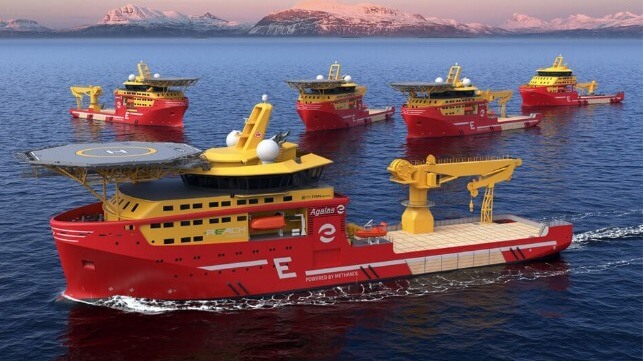New Norwegian Venture Orders First Methanol Hybrid Battery CSV

The application of methanol-fueled propulsion continues to expand with a new partnership reporting it has ordered the first Construction Support Vessel (CSV) equipped with a methanol engine and battery hybrid system. According to Norwegian shipowner Eidesvik Offshore, which is partnering with shipowner Agalas, the vessel will be the most environmentally friend within its operating segments.
The two companies are forming a new venture to be called Eidsvik Agalas and placed an order for the CSV to be built at the Sefine Shypard in Turkey. They expect the vessel to be delivered in early 2026 and will be operating in the subsea and offshore wind sectors. Management of the vessel, including crewing, will be provided by Eidesvik, which will own 50.1 percent of the venture. They have also been granted options for four additional vessels.
According to the companies, the new venture and the vessels are well-timed to the market. They project that demand for vessels in the subsea segment is about to outpace supply. They also point to the expected significant growth in offshore wind during this decade.
Eidesvik highlights its long history as a pioneer in demonstrating new emission-reducing technology, including its first-mover adoption of LNG and battery technology in offshore vessels. With its newest addition to the fleet, Eidesvik says it will once again push boundaries.
NSK Ship Design and Agalas developed a highly flexible vessel that they said will incorporate
cutting-edge technology. The ship will measure approximately 328 feet (99.9 meters) in length with accommodations for 100 people. It will have a 150-metric tonne heave-compensated crane and approximately 900 square meters of deck area.
The vessel will feature a battery hybrid system alongside dual fuel gensets capable of operating on either methanol or MGO. The estimated build cost is approximately $88 million.
The newbuild will be equipped to perform inspection, maintenance, and repair (IMR) work. Upon delivery, she will enter into a three to five-year time charter with Reach Subsea.
By adopting the technologies emerging in the industry, the new company looks not only to create a competitive advantage but also to establish a new standard for the segment. They expect it will help to accelerate decarbonization efforts in these market segments.
No comments:
Post a Comment